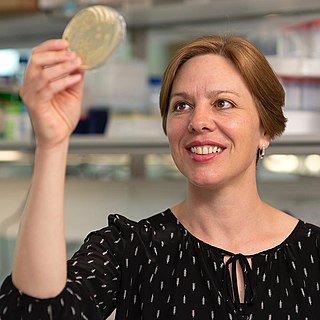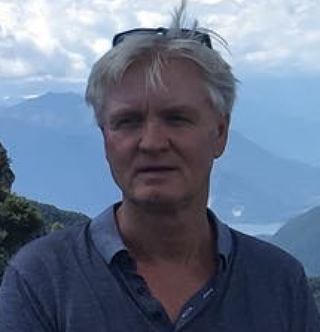Related Research Articles

David Baltimore is an American biologist, university administrator, and 1975 Nobel laureate in Physiology or Medicine. He is a professor of biology at the California Institute of Technology (Caltech), where he served as president from 1997 to 2006. He founded the Whitehead Institute and directed it from 1982 to 1990. In 2008, he served as president of the American Association for the Advancement of Science in 2008.
Polyadenylation is the addition of a poly(A) tail to an RNA transcript, typically a messenger RNA (mRNA). The poly(A) tail consists of multiple adenosine monophosphates; in other words, it is a stretch of RNA that has only adenine bases. In eukaryotes, polyadenylation is part of the process that produces mature mRNA for translation. In many bacteria, the poly(A) tail promotes degradation of the mRNA. It, therefore, forms part of the larger process of gene expression.

Alexander van Oudenaarden is a Dutch biophysicist and systems biologist. He is a leading researcher in stem cell biology, specialising in single cell techniques. In 2012 he started as director of the Hubrecht Institute and was awarded three times an ERC Advanced Grant, in 2012, 2017, and 2022. He was awarded the Spinoza Prize in 2017.

Matthias Werner Hentze is a German scientist. He is the director of the European Molecular Biology Laboratory (EMBL), co-director of the Molecular Medicine Partnership Unit between EMBL and Heidelberg University, and Professor of Molecular Medicine at Heidelberg University.

Johannes (Hans) Carolus Clevers is a Dutch molecular geneticist, cell biologist and stem cell researcher. He became the Head of Pharma, Research and Early Development, and a member of the Corporate Executive Committee, of the Swiss healthcare company Roche in 2022. Previously, he headed a research group at the Hubrecht Institute for Developmental Biology and Stem Cell Research and at the Princess Máxima Center; he remained as an advisor and guest scientist or visiting researcher to both groups. He is also a Professor in Molecular Genetics at the University of Utrecht.
Susan M. Gasser is a Swiss molecular biologist. From 2004 to 2019 she was the director of the Friedrich Miescher Institute for Biomedical Research in Basel, Switzerland, where she also led a research group from 2004 until 2021. She was in parallel professor of molecular biology at the University of Basel until April 2021. Since January 2021, Susan Gasser is director of the ISREC Foundation, which supports translational cancer research. She is also professor invité at the University of Lausanne in the department of fundamental microbiology. She is an expert in quantitative biology and studies epigenetic inheritance and genome stability. Recipient of multiple swiss and European awards, she was named member of the US Academy of Sciences in 2022.

Oscar Paul Kuipers is a Dutch professor of molecular genetics at the University of Groningen. His areas of expertise include microbiology, biochemistry, molecular and cell biology, and biotechnology.
Piet Borst CBE is emeritus professor of clinical biochemistry and molecular biology at the University of Amsterdam (UVA), and until 1999 director of research and chairman of the board of directors of the Netherlands Cancer Institute and the Antoni van Leeuwenhoekziekenhuis (NKI-AVL). He continued to work at the NKI-AVL as a staff member and group leader until 2016.

René Bernards is a Dutch cancer researcher. He is professor of molecular carcinogenesis at Utrecht University and head of the section of molecular carcinogenesis at the Netherlands Cancer Institute-Antoni van Leeuwenhoekziekenhuis. Bernards is a winner of the 2005 Spinoza Prize.
Alexander Stark is a biochemist and computational biologist working on the regulation of gene expression in development. He is a senior scientist at the Research Institute of Molecular Pathology (IMP) at the Vienna Biocenter and adjunct professor of the Medical University of Vienna.

Lori Anne Passmore is a Canadian/British cryo electron microscopist and structural biologist who works at the Medical Research Council (MRC) Laboratory of Molecular Biology (LMB) at the University of Cambridge. She is known for her work on multiprotein complexes involved in gene expression and development of new supports for cryo-EM.

Marileen Dogterom is a Dutch biophysicist and professor at the Kavli Institute of Nanoscience at Delft University of Technology. She published in Science, Cell, and Nature and is notable for her research of the cell cytoskeleton. For this research, she was awarded the 2018 Spinoza Prize.

Berend (Bert) Poolman is a Dutch biochemist, as specialist in bioenergetics of microorganisms and membrane transport. He is a professor of Biochemistry at the University of Groningen and an elected member of the Royal Netherlands Academy of Arts and Sciences (KNAW) since 2009. Poolman is a pioneer in the field of bottom-up synthetic biology, that is, the construction from molecular building blocks of functional metabolic networks and autonomously operating functional systems, which are typical of living cells. Poolman is a lecturer in membrane biology and synthetic biology.

Dirk Schübeler is a German researcher, Director of the Friedrich Miescher Institute for Biomedical Research (FMI) and professor at the University of Basel. He is an expert in gene regulation.

Casper Hoogenraad is a Dutch Cell Biologist who specializes in molecular neuroscience. The focus of his research is the basic molecular and cellular mechanisms that regulate the development and function of the brain. As of January 2020, he serves as Vice President of Neuroscience at Genentech Research and Early Development.

Yardena Samuels or Samuels-Lev is an Israeli molecular biologist who is the Director of the Ekard Institute for Cancer Diagnosis Research at the Weizmann Institute of Science. Her research considers the genetic mutations of melanoma.

Jan Hendrik Jozef Hoeijmakers is a Dutch molecular biologist, biochemist, and molecular geneticist.
Sophie Geneviève Elisabeth Martin Benton is a Swiss biologist who is Professor and Director of the Department of Fundamental Microbiology at the University of Lausanne. Her research investigates the molecular processes that underpin cellular fusion. She was awarded the EMBO Gold Medal in 2014.
Karina Elizabeth de Visser, also named "Karin E. de Visser", is a researcher at the Netherlands Cancer Institute. Her research considers metastatic formation and how the immune system influences how people respond to cancer treatment.
Nynke Hester Dekker is a Dutch biophysicist who is Professor of Molecular Biophysics at the Kavli Institute of Nanoscience at Delft University of Technology. Dekker studies individual DNA and RNA molecules and how they interact with proteins in bacteria, viruses and eukaryotes. She described how virus proteins build errors into the virus RNA of viruses. In 2020, she was awarded the Spinoza Prize.
References
- ↑ "How Cancers Hurt Themselves to Hurt Immune Cells More". Business News This Week. 20 January 2021.
- ↑ "Eight research groups Netherlands Cancer Institute to receive Dutch Cancer Society grants". Netherlands Cancer Institute.
- ↑ "How Cancers Hurt Themselves to Hurt Immune Cells More - Weizmann Wonder Wander - News, Features and Discoveries". Weizmann Wonder Wander. 16 December 2020.
- ↑ "Researchers find out what cancer cells are hungry for". Medical Xpress.
- ↑ "Reuven Agami Group | Oncogenomics | Netherlands Cancer Institute". Netherlands Cancer Institute.
- 1 2 "Reuven Agami Group". Oncode Institute.
- 1 2 "Academy of Europe: Agami Reuven". Academia Europaea.
- ↑ "Protein that could stop breast cancer discovered". The Hindu. 15 March 2010.
- ↑ "Fellowships, grants and career support – Young Investigator Programme – EMBO". 20 August 2020.
- ↑ "Find people in the EMBO Communities". people.embo.org.
- ↑ "Antoni van Leeuwenhoekprijs voor NKI-onderzoeker". Ziekenhuis.nl.
- ↑ "Alumni". De Jonge Akademie.
- ↑ "2004 : European Science Foundation". ESF.
- ↑ "Vici 2010 | NWO". www.nwo.nl.
- ↑ "2,5 miljoen ERC-subsidie voor genregulatie-onderzoek". www.avl.nl.
- ↑ "Reuven Agami" (in Dutch). Royal Netherlands Academy of Arts and Sciences. Archived from the original on 7 July 2023.